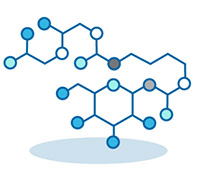Biomanufacturing

When cells survive, the future of health care is closer than ever
Nearly everyone has been or knows someone who has been affected by cancer. AAGP® could be the link to essential advancements in the realm of cell therapy and cancer immunotherapy.
Home / Applications / Biomanufacturing
The impact of AAGP®
More than one million people have been treated by cell therapies worldwide, according to Transparency Market Research. We’re researching two major ways that AAGP® can help: the development of biologics and biosimilars as well as the preservation of blood and cell products.
Our anti-aging glycopeptide molecule helps to preserve cell viability during cryostorage and biologic production. It could increase production yields of therapeutic antibodies used in immunotherapy treatments for disorders such as cancer, autoimmune diseases and infections. Biologics and immunotherapies have surged ahead to improve healthcare. The cells that make these therapies possible is great; keeping these cell therapies thriving is outstanding.
Potential applications
- Antibody production
- Cancer immunotherapy
- Blood and platelet preservation
- Cryorecovery
- Cell transplants
Applications of AAGP® in Biomanufacturing

Cell Transplants
Cell transplantation is an important component to help patients with many different conditions, for example blood stem cells or immunotherapy cells for cancer patients to insulin producing cells for diabetes. Cells transplanted into the recipient face stress from the inflammation of the operation to the anti-rejection medicine used to keep the cells secured. Often stem cells are used in cell transplantation as a medical strategy to regenerate or rejuvenate diseased or damaged organs and tissues.

Research Pipeline for Biomanufacturing:
Biologics and biosimilars
Research:
We’re in the discovery phase of how biologics and biosimilars can be generated with the help of AAGP®. With its ability to increase production yields of therapeutic antibodies used in immunotherapy treatments, this anti-aging glycopeptide could provide more hope for patients who have been diagnosed with cancer, autoimmune diseases, infections and other disorders. We believe that as a biotechnology additive we can help to lower costs and improve accessibility of next generation life-saving medical treatments for everyone.
Blood and cell product preservation
Research:
We’re also in the discovery phase of our research on AAGP®’s effects on blood and cell product preservation. We tested human and mouse neural stem cells to find out if AAGP® could preserve the cell survival number during cryopreservation.
We learned that AAGP® could help preserve stem cells during cryopreservation, giving them an advantage in cell survival while maintaining stem cell function. We feel AAGP® could help preserve stem cells for transplants in which a low density of cells can be extracted, and additional experiments will help us move forward in our research process. The potential to increase the shelf life of donor blood and blood products, like blood and platelets, could also bring added security to these critical life-saving supplies.
For investors
At ProtoKinetix, we calculate the market value of AAGP® in how well it can take care of patients. We want to help medical treatments become more successful in improving lives and helping cells survive. But we know that as an investor, you also want to know how our biotechnology can help you.
The 2025 market forecast for the biomanufacturing industry is $218 billion. Investing in the future of medicine will help you and people around the world that rely on immunotherapy treatments. The potential of our anti-aging glycopeptide is endless, and we’ve only seen the tip of the iceberg.
Research partners
Invest with us
ProtoKinetix has patented an anti-aging glycopeptide with the power to change lives through cell survival. The potential is endless, and we’ve only seen the tip of the iceberg. Get invested.
Research findings
Press releases
We’re already making headlines with our groundbreaking research on the impact AAGP® could have in the field of ophthalmology.


